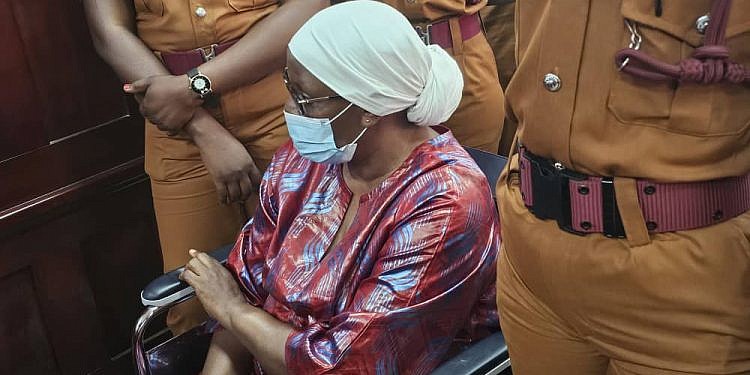Is Molly Katanga a survivor of severe domestic violence? It is a question that pervades constant discussion in the wake of the pull and shove between the unfortunate widow and the state apparatus, a matter that has reawakened concerns about Uganda’s criminal justice system.
Despite evidence adduced by her strong defence team of lawyers, which is constituted of two former head prosecutors – the highly respected Peter Kabatsi and the highly technical MacDosman Kabega, who have cited so many procedural flaws that disadvantage her defence, the office of the Director of Public Prosecutions (DPP) has continued to wantonly disregard the concerns, some which border on human rights violations.
Firstly, Ms Katanga was repeatedly denied bail, in spite of overwhelming evidence that she had survived the unfortunate incident on November 2, 2023, but left in a vegetative state and despite government doctors from the Ministry of Health, appointed by the ODPP confirming that she needed specialised treatment outside the Luzira Prison walls.
Katanga’s devastating injuries and subsequent denial of bail, despite facing serious charges of murder, raise questions about the system’s ability to hold perpetrators accountable and protect victims’ rights.
Advocates argue that the system often fails to address serious human rights issues.
According to city lawyer and human rights advocate Isaac Ssemakadde, it is now settled law that denying bail solely based on arbitrary and capricious factors such as the accused person’s age, a medical condition that could be treated in prison, or a no-objection chit by the DPP, is an unjustified restriction on liberty, violating Article 23(6)(a) of the Ugandan Constitution (right to bail) and Article 28(3)(a) (presumption of innocence).
“It also violates international human rights law, particularly Article 9(3) of the International Covenant on Civil and Political Rights, which provides that “It shall not be the general rule that persons awaiting trial shall be detained in custody…” he noted.
Mr Ssemakadse argued that in Molly Katanga’s case, the High Court judge blatantly committed two other cardinal errors — firstly, by fetishising the July 2, 2024 hearing date for Molly Katanga’s main case, “Judge Muwata disregarded a pertinent decision of the Constitutional court in Hon Sam Kuteesa & 2 others v Attorney General, Reference No 54 of 2011,” Mr Ssemakadde wrote.
The systemic flaws leading to Ms Katanga’s unjust treatment are entrenched, requiring a comprehensive overhaul of the criminal justice system, some analysts have pointed out.
“The government, judiciary, and law enforcement agencies must acknowledge the failures and work towards creating a justice system that prioritizes victims’ protection and empowerment,” an advocate who requested to speak off the record to foster a free discussion says.
For example, the right to bail is enshrined under the 1995 Constitution of Uganda. It is a procedure by which a judge or magistrate sets at liberty one who has been arrested or imprisoned upon receipt of security to ensure the released prisoner’s later appearance in court for further proceedings.
The purpose of bail pending trial in criminal cases is to avoid inflicting punishment upon an innocent person (who may later be acquitted at trial) and to encourage the unhampered preparation of their defence.
In Uganda today, analysts argue, that the ODPP has misconstrued bail as a way to punish offenders who have not been formally found guilty and has repeatedly denied bail as a form of punishment to accused persons that the office deems guilty until proven innocent.
“There have been arguments that denying bail prevents provoking and inflaming public sensitivities,” one analyst noted.
This is the argument that has been made time and again in the case of Molly Katanga – as if public sensitivities trump the constitutional presumption of innocence until proven guilty, her defence team has consistently complained.
What has been missed in all of this, is the very real fact that the concept of bail is a critical aspect of the rule of law and is an example of how our legal system reflects principles of the presumption of innocence.
The primary principles that underpin bail legislation in Uganda include the Presumption of Innocence and the Right to Liberty, and these are part of the larger framework of the rule of law.
The bail process must uphold these principles to ensure we maintain a fair and just legal system. The law is not about vengeance, rage, or prejudice.
For example, in Ms Katanga’s case, the judge’s decision to repeatedly deny bail disregarded Constitutional Court precedents perpetuated prison congestion, morbidity, mortality and case backlog.
Such has been the gravity of the issues, that a lawsuit filed at the East African Court of Justice by some members of the Ugandan public seeks to address these issues, alleging a breach of good governance principles and seeking a declaration that police, prosecutors, and judicial officers must demonstrate compelling reasons to deny bail.
This case is not just about Ms Katanga but about ensuring good governance and protecting citizens’ rights, its proponents say.
“The Ugandan government must prioritize reforming its criminal justice system to uphold justice, equality, and human rights,” one of the advocates says.
Ms Katanga’s case has also revived the longstanding debate in the Ugandan public about
Gender-based violence.
The problem is pervasive in Uganda, with 56% of married women experiencing physical and sexual violence from their husbands, according to statistics from the Ministry of Gender.
“The criminal justice system’s failure to address this issue perpetuates the cycle of violence, leaving victims without protection or recourse,” says one of the campaigners.
In the ongoing case, the ODPP and police have been accused of failure to investigate Ms Katanga’s injuries, instead accusing her of killing her husband, despite the postmortem report suggesting she was attached.
Analysts have criticised both the police and ODPP, arguing that this demonstrates a lack of a gender-sensitive approach.
Other issues that Ms Katanga’s case has exposed especially about the office of the ODPP include the slow pace of justice, reliance on circumstantial evidence, and lack of access to legal representation and medical care — all significant flaws that must be addressed through comprehensive reform.
Proponents critical of the ODPP for lack of procedural fairness in Ms Katanga’s case, cite an example of the late Bob Kasango, who reportedly tragically died in Luzira Prison two weeks after he was ‘maliciously’ denied bail.
Following his demise, Luzira prison confirmed that he had been ill and, in fact, died en route to Mulago Hospital.
He had been denied proper medical care in spite of the fact that medical reports had deemed his life in urgent need of specialist medical attention.
In his eulogy, Andrew Mwenda said, “Bob didn’t have to die at this early age and in the way he did – alone and lonely, away from the care of his family and friends or competent doctors, in a prison hospital not equipped to handle his condition”.
The judiciary issued a statement at the time denying any responsibility for Kasango’s death. They argued that the only thing they did was to simply deny him bail!
Analysts cite these precedents and hence argue that the criminal justice system should not be engineered to undercut established principles of fairness and justice.
“It must not be employed to exact revenge at the behest of invisible puppet masters pulling the DPP’s strings,” an advocate, unhappy with the conduct of the ODPP in Ms Katanga’s case argued.
He wondered why the wheels of justice move so slowly in the Ugandan judicial system that accused persons remain imprisoned for as many as seven years before they are heard.
Citing an example of NUP activist Olivia Lutaaya and her co-accused who were charged with making petroleum bombs and have been on remand for three years at the behest of a military tribunal.
“The state has not adduced any shred of evidence against her, and yet she can not be granted bail. The state, in essence, has enough evidence to keep her imprisoned for three years but not enough to commence her trial,” the advocate said, adding that Ms Lutaaya is a textbook example of why the right to bail exists.
“Should a trial eventually take place and acquit her – how would she be compensated for the loss of liberty for three years?
Why is the ODPP so cavalier about human rights? Do they not know the old adage that “injustice anywhere is a threat to justice everywhere?” he asked.
As Ms Katanga and her co-accused take their turn in court, it is important that the process weaknesses in the criminal justice system in Uganda are identified, discussed and addressed to foster a fair process for all.


